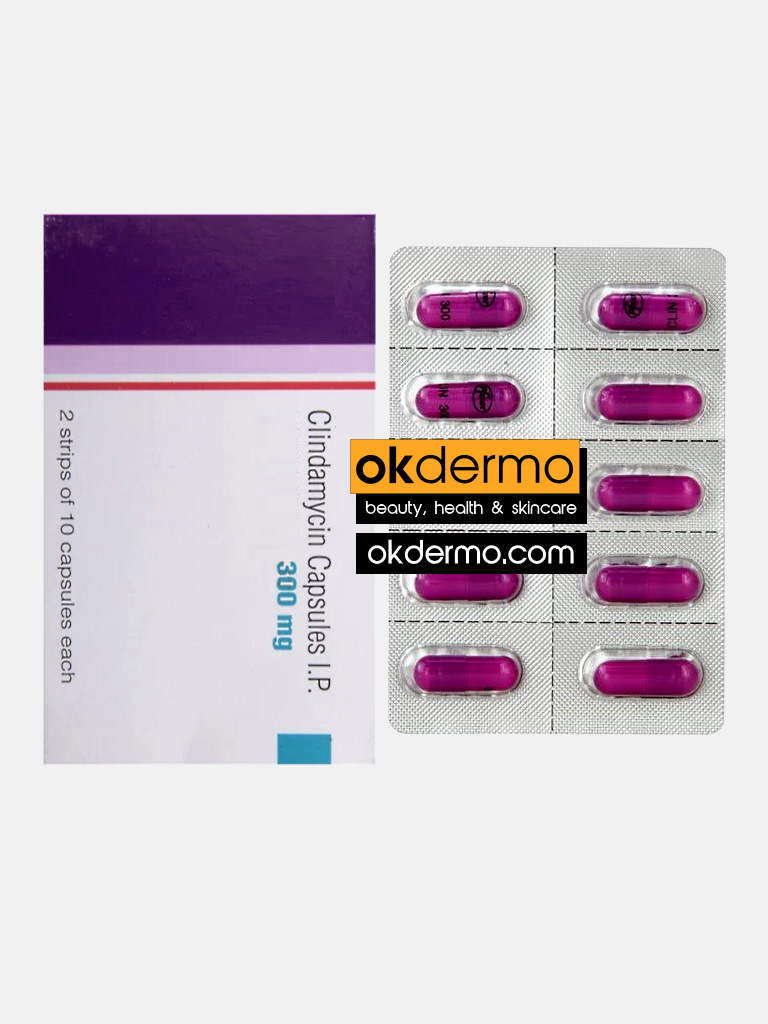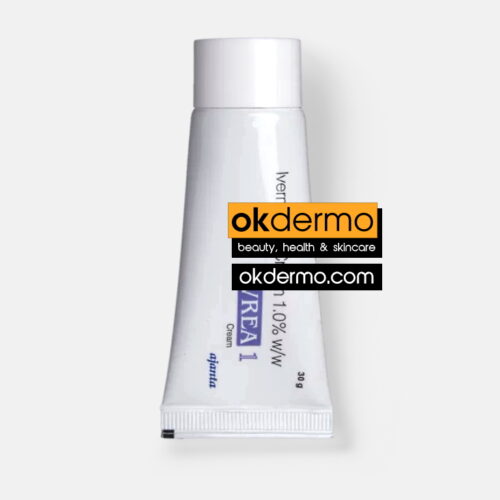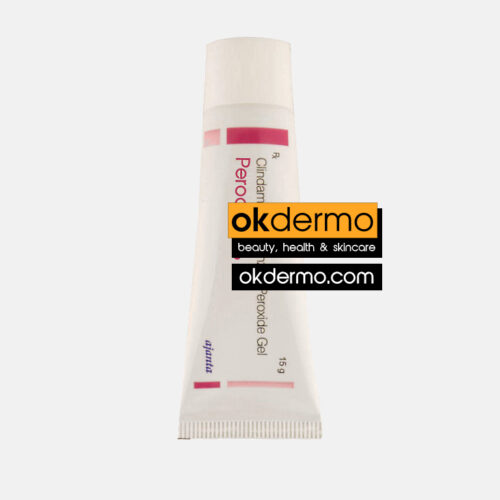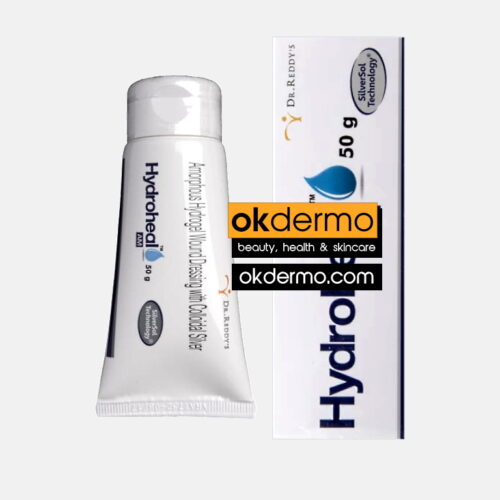Description
What is Clindamycin 150mg-300mg Capsules
Capsules contain the antibiotic Clindamycin in 150mg and 300mg strengths, a lincosamide antibiotic with bacteriostatic action that is used to treat a wide range of serious bacterial infections.
Clindamycin 150mg-300mg Capsules is used for the treatment of serious bacterial infections caused by susceptible bacteria, mainly anaerobic bacteria in different parts of the body, and are particularly helpful to treat people who are allergic to penicillin antibiotics and for infections caused by penicillin-resistant staphylococci. These infections include, upper and lower respiratory tract infections, such as bronchitis pharyngitis, tonsillitis, sinusitis otitis medis (ear infection), scarlet fever, pneumonia and emphysema; skin and soft tissue infections, such as furuncles (boils), abscesses, cellulitis (infected area of skin causing inflammation), impetigo (superficial skin infection causing sores) and wound infection; bone and joint infections like osteomyelitis and septic arthritis; pelvic infections like endometritis (inflammation of the endometrium, the inner lining of the uterus), abdominal infections like peritonitis; septicaemia (bacterial infection of the blood) and endocarditis; dental infections such as periodontal abscess and periodontitis.
Clindamycin 150mg-300mg Capsules is also used as an alternative treatment for malaria that is resistant to other medication when used in combination with quinine or amodiaquine. Clindamycin capsules 150mg or 300mg should not be used for viral infection as viruses use a different mechanism to grow and replicate.
How does Clindamycin work?
Clindamycin 150mg-300mg Capsules contains the antibiotic clindamycin, a lincosamide antibiotic with bacteriostatic action that is used to treat a wide range of serious bacterial infections. Clindamycin binds to the bacterial ribosome, a structure involved in protein synthesis and this inhibits the early stages of bacterial protein synthesis, so that the bacteria cannot make important proteins required for survival of the bacteria and this kills the bacteria. This action of clindamycin in Clindamycin 150mg-300mg Capsules reduces bacterial growth and prevents the spread of infection.
What does Clindamycin contain?
Clindamycin 150mg-300mg Capsules contains the active ingredient clindamycin hydrochloride, an antibiotic used to treat a variety of serious bacterial infections. They also may contain: lactose monohydrate, magnesium stearate, maize starch, purified talc, gelatin, erythrosine CI45430, indigo carmine, CI73015, and titanium dioxide.
Treating bacterial infection with Clindamycin 150mg-300mg
Clindamycin 150mg-300mg Capsules contains the antibiotic clindamycin that used to treat a variety of serious bacterial infections caused by susceptible bacteria, mainly anaerobic bacteria in different parts of the body; and are particularly helpful to treat people who are allergic to penicillin antibiotics and for infections caused by penicillin-resistant staphylococci.
Clindamycin capsules 150mg /300mg binds to the bacterial ribosome, a structure involved in protein synthesis and this inhibits the early stages of bacterial protein synthesis, so that the bacteria cannot make important proteins required for survival of the bacteria and this kills the bacteria. This action of Clindamycin 150mg-300mg Capsules reduces bacterial growth and prevents the spread of infection.
Infections that can be treated by Clindamycin capsules include, upper and lower respiratory tract infections, such as bronchitis pharyngitis, tonsillitis, sinusitis otitis medis (ear infection), scarlet fever, pneumonia and emphysema; skin and soft tissue infections, such as furuncules (boils), abscesses, cellulitis (infected area of skin causing inflammation), impetigo (superficial skin infection causing sores) and wound infection; bone and joint infections like osteomyelitis and septic arthritis; pelvic infections like endometritis (inflammation of the endometrium, the inner lining of the uterus), abdominal infections like peritonitis; septicaemia (bacterial infection of the blood) and endocarditis; dental infections such as periodontal abscess and periodontitis.
Side effects of Clindamycin 150mg-300mg?
The most commonly reported side effects when taking Clindamycin capsules orally include: abdominal pain, oesophagitis and oesophagial ulcer, nausea, vomiting and diarrhea, distorted sense of taste, skin rash, hives (urticaria), Inflammation of the vagina (vaginitis). A more serious side effect is colitis (inflammation of the colon) including pseudomembranous colitis, with symptoms including severe diarrhoea, abdominal cramps, passage of blood and mucous and fever. This is usually caused by the antibiotic effect of clindamycin in the intestines, which allows overgrowth of the toxin-producing bacterium clostridium.
When should oral Clindamycin not be used?
You should not use Clindamycin 150mg-300mg Capsules if you:
- are allergic to clindamycin, lincomycin or any ingredients in Clindamycin
- are pregnant or are breastfeeding
- have severe kidney or liver disease, without discussion with your doctor
- have a history of gastrointestinal disease, particularly colitis
- have meningitis, as clindamycin does not penetrate the blood/brain barrier sufficiently
- are atopic, which predisposes you to asthma, eczema or hayfever
- are taking medicines that are affected by Clindamycin, including the antibiotic erythromycin; neuromuscular blockers, estrogen-based contraceptives, anticholinesterases like neostigmine and pyridostigmine for myasthenia gravis
How should Clindamycin oral be taken?
You should take your Clindamycin 150mg-300mg Capsules swallowed whole with a glass of water, while sitting in an upright position to avoid irritation of the esophagus. The dose you take and how often depends on your condition and your doctor’s recommendation, usually every 6 hours, and for up to 10-14 days depending on the severity of your infection. You should complete the course of Clindamycin 150mg-300mg Capsules or your infection may return.




























